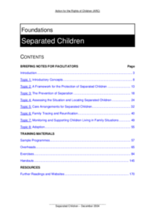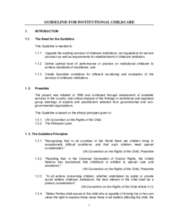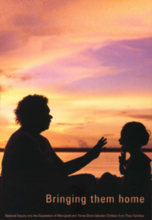Displaying 14371 - 14380 of 14579
Comprehensive guide to programming for separated children. Includes chapters on agency co-ordination, prevention, documentation, tracing, reunification and emergency and interim care placements.
A training resource pack on preventing the separation of children from their caregivers, assessing and locating separated children, care arrangements, family tracing and reunification, and monitoring and supporting separated children.
This document is a guideline to facilitate good policy and practice within both institutional care and community-based care settings for children in Ethiopia. It addresses the physical environment, staffing, gatekeeping, child services, reunification, adoption and general administration.
These regulations were developed in the United States (in the state of Rhode Island) to assess all individuals who care for children away from their legal parents. It may contain useful information for organizations and countries that are developing their own regulations for foster carers.
This paper explores the factors surrounding the lives of children that live on the streets or in institutions in Egypt.
An overview of the basic principles of child welfare that social workers should follow in order to prevent family separation and promote quality care for children.
The Children Act, Chapter 59 took effect in Uganda on 1 August, 1997.
This chapter provides an overview of a child care institution, the Osu Children’s Home, in Ghana.
This report from Australia's Human Rights and Equal Opportunity Commission aimed to trace the past laws, practices and policies which resulted in the separation of Aboriginal and Torres Strait Islander children from their families by compulsion, duress or undue influence, and the effects of those laws, practices and policies.
Ideas and country examples on how to create or transform an educational centre for children living and working on the street.








